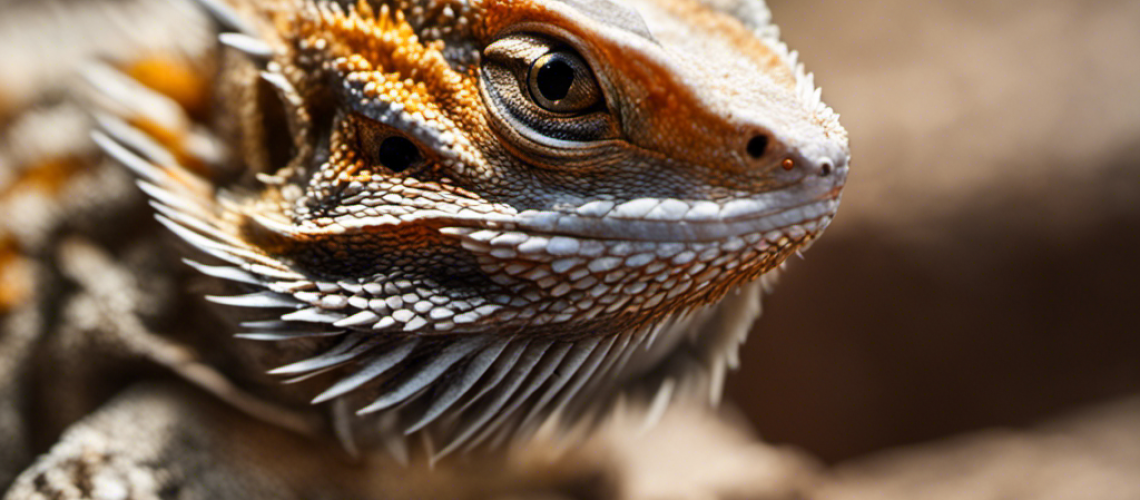Bearded dragons are beloved reptilian pets that require a specific diet to ensure their wellbeing. One essential component of their dietary needs is calcium powder, which has the potential to be dangerous if not administered properly.
This article will discuss the reasons why calcium powder is necessary, the health problems associated with not using it, and how to best administer it to your bearded dragon.
Key Takeaways
- Not using calcium powder can lead to serious health issues such as skeletal deformities and metabolic bone disease.
- It can also cause an imbalance between phosphorus and calcium levels, which can be detrimental to the bearded dragon’s health.
- The dangers of not administering calcium powder include nutritional secondary hyperparathyroidism and weakened bones.
- The best sources of calcium powder are fortified food and calcium powder supplementation, which are easily accessible and economical options for ensuring proper calcium intake.
Reasons Why Calcium Powder Is Necessary
Calcium powder is an essential component of a bearded dragon’s diet, as it provides the necessary nutrients for healthy growth and development. A calcium deficiency can have serious consequences, including stunted growth, metabolic bone disease, and other health issues.
To maintain a balanced diet, it is important that bearded dragons receive adequate calcium supplementation from either a quality food source or calcium powder. Without sufficient calcium in their diets, these reptiles may suffer long-term health complications that could be avoided with proper nutrition.
Health Problems of Not Using Calcium Powder
Failure to provide calcium supplementation may lead to health problems for bearded dragons. Calcium deficiency can cause skeletal deformities and metabolic bone disease, while too much calcium intake can result in calcium toxicity. Both of these conditions can lead to serious health issues due to the lack of balance between phosphorus and calcium levels in the body.
It is important that owners understand the importance of providing adequate amounts of dietary calcium through supplements like powder or liquid forms for their pet beardies.
Dangers of Not Administering Calcium Powder
Administration of inadequate dietary calcium can pose serious health risks for bearded dragons. Calcium deficiencies can lead to metabolic bone disease, which causes weakened bones and skeletal deformities. Poor vitamin balance may lead to nutritional secondary hyperparathyroidism, a condition causing overstimulation of the parathyroid gland and resulting in poor digestion and organ failure. Additionally, insufficient calcium intake is linked to reduced growth rate and reproductive issues.
- Metabolic bone disease
- Nutritional secondary hyperparathyroidism
- Reduced growth rate & reproductive issues
Best Sources of Calcium Powder
Supplementation of dietary calcium is recommended to prevent health risks in bearded dragons. Fortified food and supplementing the diet with calcium powder are two common methods of doing so.
Calcium powder is easily accessible, economical, and can be added to all foods a dragon eats. It should be free of phosphorus and contain vitamin D3 for proper absorption by the body. The best sources of calcium powder are those specifically formulated for reptiles or birds, as they meet all dietary requirements.
Additionally, it’s important to consult with an experienced veterinarian before making any dietary changes.
How to Administer Calcium Powder to Your Bearded Dragon
The process of supplementing bearded dragons with calcium powder must be carefully considered. Administering it correctly is essential to ensure the safety and health of the pet. Here are three steps to take when considering its use:
-
Measure out the recommended daily allowance of calcium for your bearded dragon’s size, age, and activity level.
-
Sprinkle a pinch of calcium powder over its food once or twice a day, ensuring that it evenly distributes across all pieces.
-
Monitor your dragon’s calcium intake over time to ensure that they are receiving the correct amount for their needs.
Frequently Asked Questions
What Other Supplements Should Be Given to a Bearded Dragon?
Bearded dragons require a balanced diet of vegetables, insects and calcium sources for optimal health. Variety is key; include a wide selection of dark leafy greens and other vegetables in their meals to ensure they receive adequate nutrition. Calcium supplements should be provided on a regular basis from natural sources such as crushed eggshells or cuttlebone.
How Often Should Calcium Powder Be Administered?
Calcium powder should be administered regularly to ensure that bearded dragons receive adequate calcium sources. Dosage levels should be monitored, as too much can cause health issues.
How Do Calcium Powder and Vitamin D3 Interact?
Calcium metabolism and vitamin balance are closely related. Calcium powder and vitamin D3 work together to maintain healthy calcium levels in the body, aiding in the absorption of calcium from food sources. Without proper supplementation, deficiencies can occur, leading to potential health risks.
What Are the Signs of Calcium Deficiency in a Bearded Dragon?
Signs of calcium deficiency in a bearded dragon include bone malformation and metabolic disorders. These can manifest as skeletal deformities, poor appetite, lethargy, and lack of energy. Prompt diagnosis and treatment are essential for optimizing health.
What Are the Side Effects of Consuming Too Much Calcium Powder?
Consuming too much calcium powder can lead to a calcium balance disturbance, resulting in calcium toxicity. Symptoms of this may include muscle and skeletal weakness, lethargy, lack of appetite, vomiting, and diarrhea. It is important to ensure the correct amount of calcium powder is consumed for optimal health.
Conclusion
In conclusion, it is essential to provide a bearded dragon with calcium powder. Without proper calcium supplementation, a bearded dragon can suffer from numerous health problems such as metabolic bone disease and softening of the shell.
The best sources of calcium include crushed oyster shells, dolomite lime, and cuttlebone. When administering calcium powder to your bearded dragon it should be done in moderation according to the instructions on the product label or with professional guidance.
Proper use of calcium powder will ensure your pet remains healthy and happy for many years to come.






